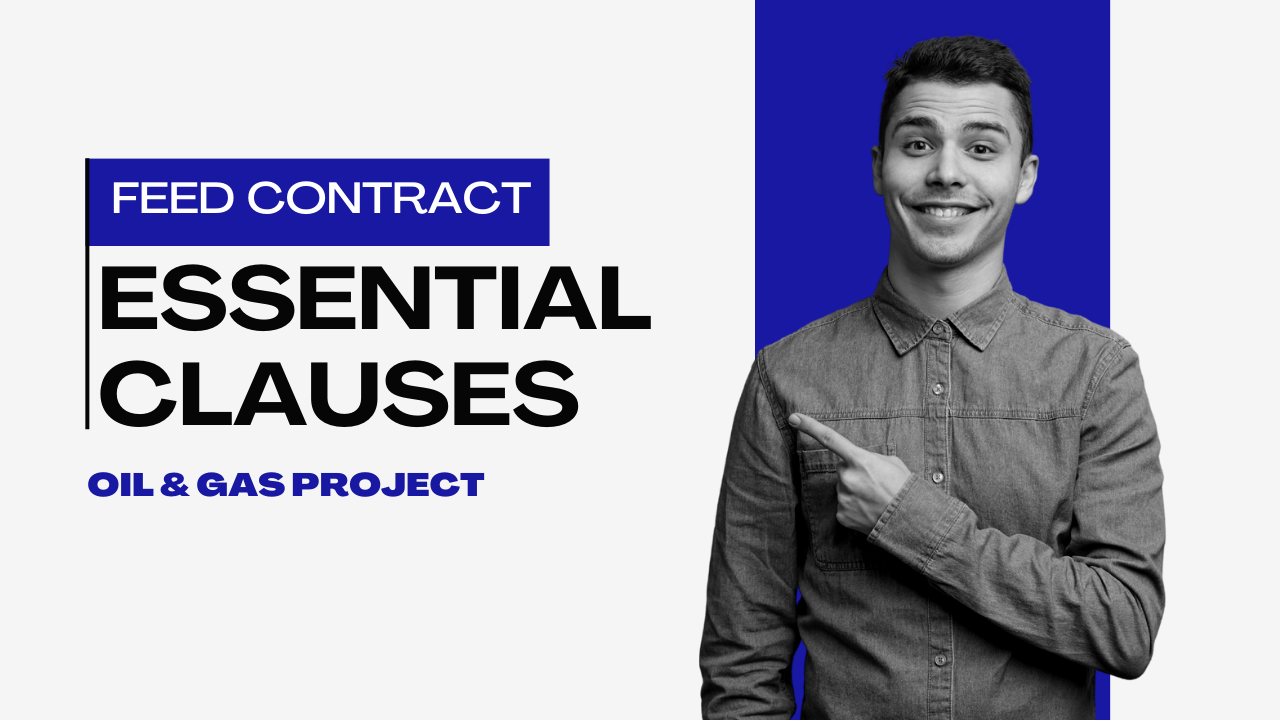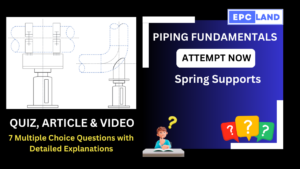Introduction
In the realm of oil and gas projects, feed contract clauses play a pivotal role in defining the terms, obligations, and expectations between parties involved. These clauses not only outline the project’s scope and specifications but also establish the legal framework that safeguards interests. In this comprehensive guide, we delve into the intricacies of feed contract clauses for oil and gas projects, shedding light on their significance and providing valuable insights to navigate these agreements successfully.
Table of Contents
Don’t miss the Complete Course on Piping Engineering: Check Now
By EPCLand.com
Feed Contract Clauses for Oil & Gas Project: An In-Depth Overview
Feed Contract Clauses for Oil & Gas Project encompass a range of critical components that set the stage for collaboration between stakeholders. Let’s delve into the key aspects that constitute these essential clauses.
Defining Project Scope and Deliverables
In this section, the project’s scope is precisely outlined, including specifications, milestones, and expected outcomes. This helps to align all parties’ expectations from the outset.
Technical and Performance Specifications
Here, technical requirements and performance expectations are detailed. This ensures that the project’s execution meets quality standards and adheres to agreed-upon benchmarks.
Payment Terms and Schedule
This clause addresses financial matters, covering payment amounts, methods, and schedules. Clarity in payment terms minimizes the risk of misunderstandings and disputes.
Intellectual Property Rights
Protecting intellectual property is crucial. This section clarifies ownership of project-related intellectual property, fostering a transparent approach to innovations.
Risk Allocation and Liability
Addressing potential risks and liabilities is vital. This clause defines responsibilities in the event of unforeseen events, promoting a fair distribution of risks among parties.
Change Management
Projects evolve, and changes may be necessary. This clause outlines procedures for proposing, approving, and implementing changes, ensuring a structured approach to modifications.
Confidentiality and Data Security
Oil and gas projects involve sensitive information. This section safeguards confidentiality and data security, fostering trust among collaborators.
Dispute Resolution Mechanisms
In case disputes arise, a clear resolution process is essential. This clause outlines mechanisms such as arbitration or mediation, promoting swift and fair conflict resolution.
Force Majeure
Unforeseen circumstances, like natural disasters, can impact projects. This clause outlines the consequences and actions to be taken in such scenarios.
Termination and Exit Strategies
This section defines conditions under which the contract can be terminated. It also outlines exit strategies, minimizing disruptions in case of contract dissolution.
Regulatory Compliance
Oil and gas projects are subject to regulations. This clause ensures adherence to applicable laws, minimizing legal complications.
Navigating Legal Considerations
While feed contract clauses offer a comprehensive framework, legal aspects require careful consideration. Expert legal counsel can provide invaluable insights to ensure the clauses align with local laws and regulations. Additionally, involving legal experts can help draft precise language that minimizes ambiguity and potential conflicts.
Expert Insights: Ensuring Successful Project Execution
To gain a deeper understanding of feed contract clauses’ significance, we reached out to industry experts for their insights.
“Effective feed contract clauses act as the foundation of a successful project. They establish a clear roadmap, mitigate risks, and provide a framework for collaboration. It’s crucial to approach these agreements with diligence and a collaborative spirit.” – John Smith, Oil & Gas Industry Expert.
Frequently Asked Questions (FAQs)
Q: What role do feed contract clauses play in oil and gas projects? A: Feed contract clauses define the terms, responsibilities, and legal framework of the project, ensuring all parties are aligned and risks are mitigated.
Q: How do payment terms impact project dynamics? A: Clear payment terms prevent misunderstandings, ensuring timely compensation and fostering a healthy working relationship.
Q: Can feed contract clauses be modified after agreement? A: Yes, but modifications should follow a structured change management process to avoid disruptions and conflicts.
Q: What happens in case of project termination? A: Termination clauses outline conditions and procedures, minimizing disruptions and outlining exit strategies.
Q: How do regulatory compliance clauses influence project execution? A: Regulatory compliance clauses ensure adherence to laws, minimizing legal hurdles and potential penalties.
Q: Why is intellectual property protection crucial in such contracts? A: Intellectual property protection prevents disputes over ownership of innovations and encourages collaborative innovation.
Conclusion
Navigating feed contract clauses for oil and gas projects is a complex yet essential endeavor. By understanding the critical components, legal considerations, and expert insights, stakeholders can forge successful partnerships and execute projects with confidence. As the energy industry continues to evolve, these clauses will remain fundamental in shaping the path to success.
Recommended courses (Published on EPCLand):
- Basics of Piping Engineering
- Piping Layout Engineering
- Piping Material Engineering
- Piping Stress Analysis
- Complete Course on Piping Engineering
- Material Requisitions
- Piping Material Specifications
- Valve Material Specifications
Related Video
Attempt Quiz
Question 1:
What does “FEED” stand for in the context of an Oil & Gas project?
Explanation: “FEED” stands for Front-End Engineering Design, which is the initial phase of the engineering design process for an Oil & Gas project.
Question 2:
What is the main purpose of including “Force Majeure” clause in a FEED contract?
Explanation: The main purpose of including a “Force Majeure” clause in a FEED contract is to allocate risks and liabilities between parties in the event of unforeseen events or circumstances beyond their control.
Question 3:
What is the significance of a “Change Order” clause in a FEED contract?
Explanation: A “Change Order” clause in a FEED contract allows for modifications to the scope of work and contract terms, providing a mechanism to address changes that may arise during the project.
Question 4:
What is the purpose of an “Intellectual Property” clause in a FEED contract?
Explanation: An “Intellectual Property” clause in a FEED contract addresses the ownership, usage rights, and protection of project-related intellectual property, including designs, documents, and innovations.
Question 5:
What is the purpose of a “Confidentiality” clause in a FEED contract?
Explanation: A “Confidentiality” clause in a FEED contract is included to protect the confidentiality of sensitive project information, ensuring that proprietary and confidential data is not disclosed to unauthorized parties.



